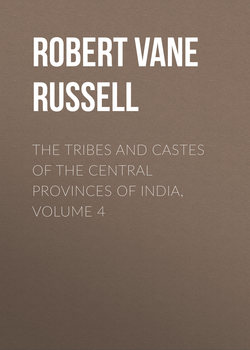Читать книгу The Tribes and Castes of the Central Provinces of India, Volume 4 - Robert Vane Russell - Страница 9
Part II
Articles on Castes and Tribes
Kumhār—Yemkala
Vol. IV
Kumhār
8. Estimation of the pig in India
ОглавлениеWe thus see how the pig in ancient Greece was worshipped as a corn-deity because it damaged the crops and subsequently became an anthropomorphic goddess. It is suggested that pigs are offered to Bhainsāsur by the Hindus for the same reason. But there is no Hindu deity representing the pig, this animal on the contrary being regarded as impure. It seems doubtful, however, whether this was always so. In Rājputāna on the stone which the Regent of Kotah set up to commemorate the abolition of forced taxes were carved the effigies of the sun, the moon, the cow and the hog, with an imprecation on whoever should revoke the edict.8 Colonel Tod says that the pig was included as being execrated by all classes, but this seems very doubtful. It would scarcely occur to any Hindu nowadays to associate the image of the impure pig with those of the sun, moon and cow, the representations of three of his greatest deities. Rather it gives some reason for supposing that the pig was once worshipped, and the Rājpūts still do not hold the wild boar impure, as they hunt it and eat its flesh. Moreover, Vishnu in his fourth incarnation was a boar. The Gonds regularly offer pigs to their great god Bura Deo, and though they now offer goats as well, this seems to be a later innovation. The principal sacrifice of the early Romans was the Suovetaurilia or the sacrifice of a pig, a ram and a bull. The order of the words, M. Reinach remarks,9 is significant as showing the importance formerly attached to the pig or boar. Since the pig was the principal sacrificial animal of the primitive tribes, the Gonds and Baigas, its connection with the ritual of an alien and at one time hostile religion may have strengthened the feeling of aversion for it among the Hindus, which would naturally be engendered by its own dirty habits.
8
Rājasthān, ii. p. 524.
9
Orphèus, p. 152.
